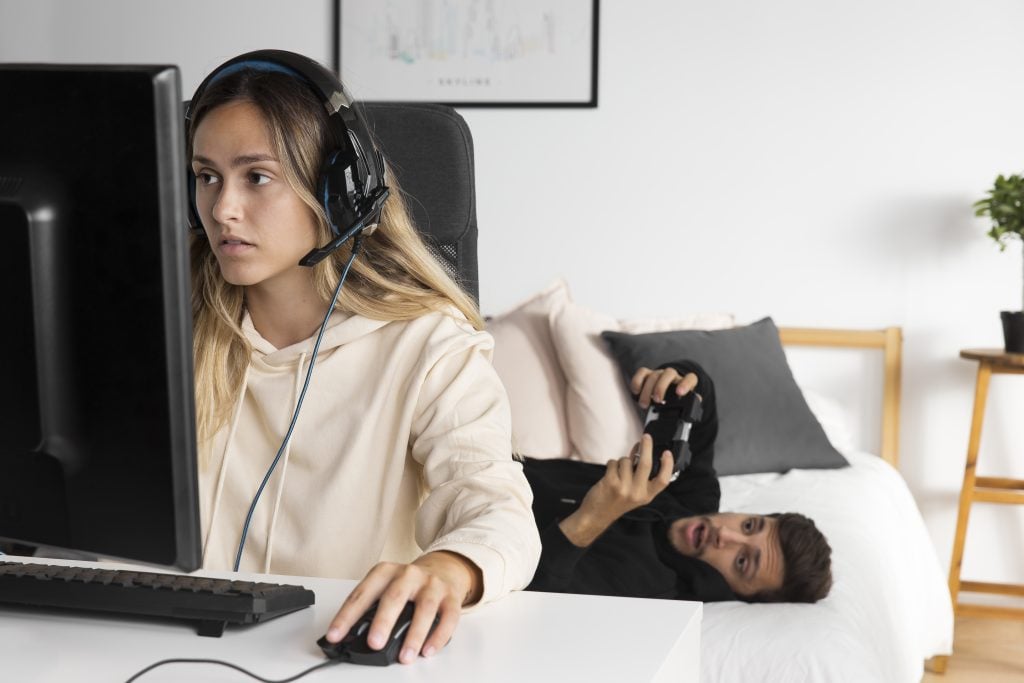When people think of gaming reflexes, they picture lightning-speed hand movements, sharp turns, and instant reactions. But behind every flick of the wrist and every button press, something deeper is happening. The brain, not the controller, is the real hero. Modern research shows that quick gaming reflexes are not just about muscle memory—they’re tightly linked to mental health, focus, and emotional balance. In fact, studies from cognitive science show that professional gamers process visual information up to 25% faster than the average person. That speed isn’t just skill—it’s a mental health exercise in disguise.
Mind and Motion: The Hidden Psychology of Reaction
Reaction time begins in the brain, long before the fingers move. When a player sees a sudden flash on the screen—a rival, a threat, an opening—the visual cortex kicks into action. The signal travels to the motor cortex, where movement is planned, and then to the muscles. This chain happens in milliseconds.
But here’s what’s often overlooked: mental health stability plays a huge role in that chain. Players dealing with anxiety or stress react slower because the brain’s attention is divided. The amygdala (the part that handles emotions) starts fighting with the prefrontal cortex (the part that makes quick, logical decisions). In short: when the mind is cluttered, reflexes slow. When it’s clear, reaction time sharpens like a blade.
That’s why regular gamers often show improved mood regulation and sharper attention spans. It’s not magic. It’s mental training hidden in plain sight.
Gaming as Cognitive Therapy
You could say that gaming is a kind of cognitive gym. It’s not about sitting in front of a screen; it’s about what your brain does while you’re there. Every movement trains coordination, timing, and strategic prediction. Fast-paced games—like action or racing titles—have been linked to improvements in working memory and problem-solving.
According to research published by the American Psychological Association, gamers show enhanced connectivity in brain areas linked to attention and visual-spatial skills. Interestingly, the same regions help with emotional regulation and resilience.
So, the link between gaming reflexes and mental health isn’t coincidence—it’s circuitry. Every time you dodge, aim, or counter an attack, your brain practices balance. And in that balance lies the foundation for emotional stability.
Quick Thinking Under Pressure
Healthy reflexes depend not just on speed, but on control. In competitive gaming, one wrong move can mean instant loss. Players who panic freeze. Those who stay calm adapt. Mental health, then, becomes a competitive edge.
A stable mindset helps filter distractions, manage frustration, and maintain focus even after repeated failures. It’s not unlike meditation—except the mantra is a flashing screen and a digital countdown.
Have you seen how AI breaks legendary human records in just one day of training? This is simply working with data and reacting calmly to changing variables. For AI, this game is like solving a complex equation using the Google Maths Solver extension for a human. But this applies not only to mathematics and math solvers; the ability to work with data with a cool head is an important skill for gamers, but it’s not easy to develop.
When Reflex Meets Reason
The beauty of gaming reflexes is not just their speed, but their intelligence. Fast reactions mean nothing without accuracy. The real power lies in how fast a player can analyze information, predict outcomes, and act accordingly. That requires emotional regulation—a key sign of good mental health.
A gamer with poor focus may react too soon or too late. A balanced gamer knows when to wait. This delicate synchronization between emotion and logic is the same mechanism used in high-stress real-world jobs: air traffic control, surgery, even firefighting.
So yes, when you train reflexes in gaming, you’re also teaching your brain how to stay calm and precise in life’s high-speed moments.
The Mental Health Upside
Regular gaming can act as an emotional stabilizer. It offers routine, feedback, and achievement—all factors that promote mental wellbeing. But moderation is key. Too much screen time or social isolation can reverse the benefits.
A balanced gaming schedule, combined with physical breaks, boosts dopamine in healthy amounts. That means improved motivation, focus, and confidence. In fact, a 2022 study by Oxford University found that moderate gaming (up to 10 hours per week) correlated with better life satisfaction and mood regulation.
Many players also recognize that mental clarity and focus are closely tied to overall lifestyle habits, and some turn to broader health resources like a comprehensive guide about weight loss to better understand how sleep, nutrition, and physical wellbeing support sustained cognitive performance.
It’s a reminder that mental health doesn’t always come from silence or meditation. Sometimes, it comes from the quiet focus of a late-night gaming session, when your reflexes and mind become one continuous rhythm.
Reflex Training Beyond the Screen
The effects of gaming reflexes don’t stop when the console powers off. Studies show gamers often make faster decisions in everyday situations—whether it’s driving, multitasking at work, or reacting to unexpected changes.
Even surgeons have used video games as part of training to enhance hand-eye coordination and stress management. One medical report showed that laparoscopic surgeons who played video games regularly made 37% fewer errors in practice.
So, when we talk about gaming reflexes, we’re not just discussing playtime. We’re discussing a neurological workout that can sharpen thinking, increase adaptability, and promote long-term mental resilience.
Conclusion: The Mind Behind the Movement
Fast fingers are impressive, but a fast, stable mind is the real secret. Gaming trains the brain to handle chaos, make decisions under pressure, and recover from setbacks—all crucial aspects of mental health.
So, the next time someone says gaming is just a hobby, remind them it’s more than that. It’s a living experiment in psychology and precision—a balance between speed and serenity. Your gaming reflexes aren’t just about quick moves. They’re proof that a well-trained mind reacts not only faster but also smarter.
And that, in every sense, is the ultimate win.






